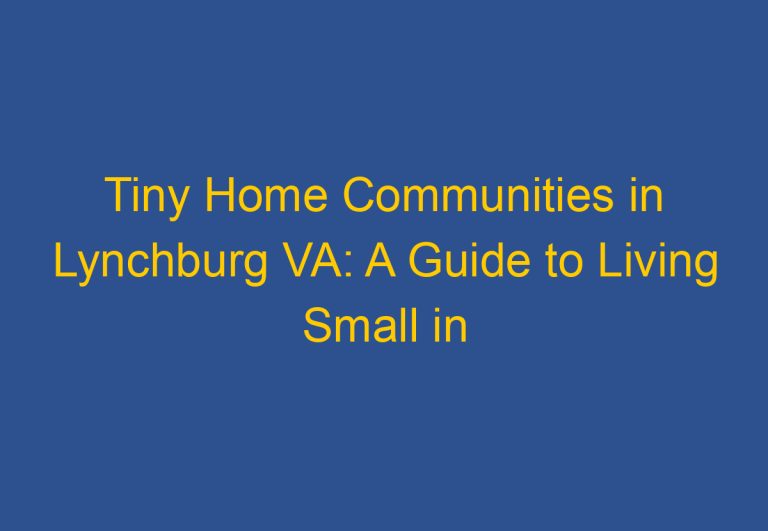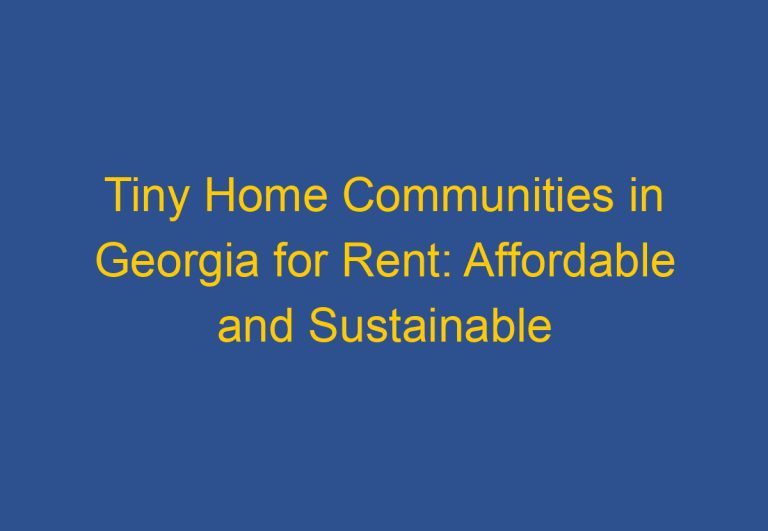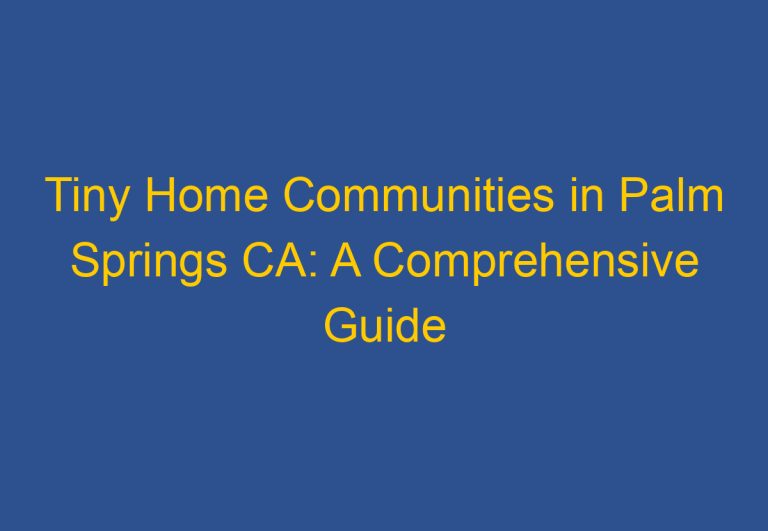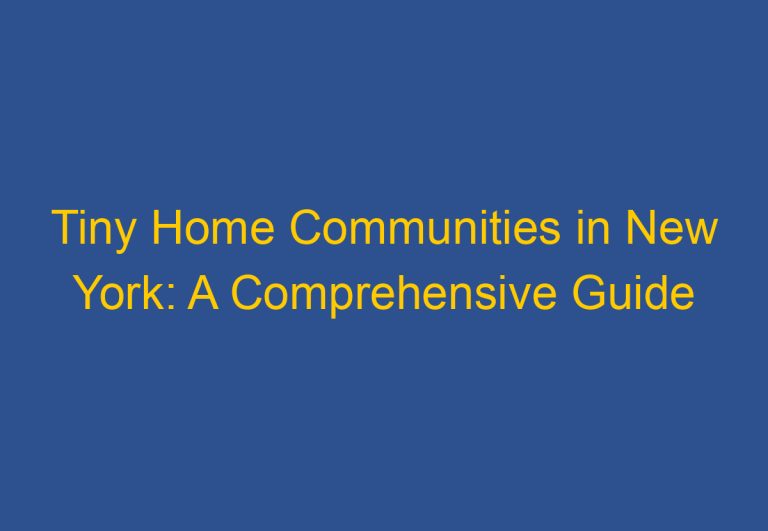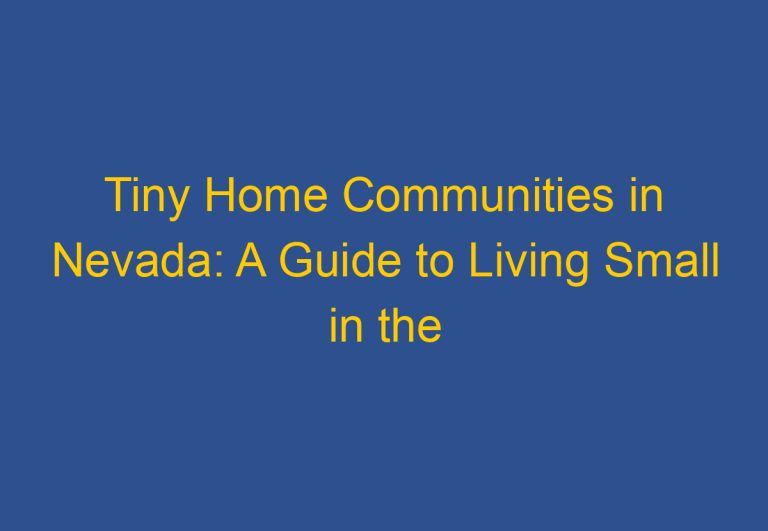Tiny Home Communities in Portland Oregon: A Comprehensive Guide
Portland, Oregon has become a hub for tiny home communities in recent years. With a growing need for affordable housing options, tiny homes have emerged as a popular solution. These communities offer a unique lifestyle that is both sustainable and affordable, and they are quickly gaining popularity among those looking to downsize and live more simply.
Tiny home communities in Portland, Oregon come in all shapes and sizes, from RV parks to custom-built neighborhoods. One of the most popular options is My Tiny House Village, located just 30 minutes outside of Portland in Oregon Wine Country. This tiny home destination offers four different tiny homes for rent, each with its own unique design and amenities. Guests can enjoy the scenic Pacific Northwest and explore local destinations and shops while living tiny.
For those looking to purchase a tiny home in Portland, there are also many options available. Tiny House Listings offers a variety of tiny homes for sale throughout the city and beyond. One popular option is the Mossyrock Rollingstone Custom Tiny Home, which boasts one bedroom, one bathroom, and 274 square feet of living space. With a price tag of $199,000, this tiny home offers a modern, premium living experience at an affordable price.
Exploring Tiny Home Communities in Portland
Portland, Oregon is known for its progressive and sustainable approach to living. It’s no surprise that tiny home communities have become a popular housing option in this city. In this section, we will explore the benefits of tiny living in Portland, key communities in the area, and the zoning and regulations for tiny homes.
Benefits of Tiny Living in Portland
Tiny homes are a great option for those who want to live sustainably and minimize their environmental impact. They require less energy to heat and cool, and often use renewable energy sources such as solar power. Additionally, tiny homes are often built using eco-friendly materials and construction methods.
In Portland, tiny homes also offer an affordable housing option. With rising real estate prices in the city, many people are turning to tiny homes as a way to own their own home without breaking the bank. Furthermore, many tiny home communities offer shared amenities such as laundry facilities and community gardens, which can help reduce utility bills and foster a sense of community among residents.
Key Communities: Simply Home Community and Others
One of the most well-known tiny home communities in Portland is the Simply Home Community. Located in the Cully neighborhood, this community features 25 tiny homes and a shared community garden. Residents pay a monthly fee that includes lot rent, water, sewer, and garbage services.
Other notable tiny home communities in Portland include the Going Places community, which features two tiny homes and a shared traditional home, and the Green Anchors community, which is built entirely out of repurposed shipping containers.
Zoning and Regulations for Tiny Homes
While tiny homes are a popular housing option in Portland, they are not without their regulatory challenges. In general, tiny homes are considered accessory dwelling units (ADUs) and are subject to the same zoning and building regulations as other ADUs.
However, there are some specific regulations that apply to tiny homes. For example, in Portland, tiny homes must be built on a foundation and cannot be moved once they are installed. Additionally, tiny homes must meet certain size requirements and must be connected to the city’s water and sewer systems.
Overall, tiny home communities offer a unique and sustainable housing option in Portland, Oregon. With their affordable prices, shared amenities, and eco-friendly construction, they are a great choice for those looking to live a simpler and more sustainable lifestyle.
Ownership and Lifestyle
Costs and Savings Associated with Tiny Homes
Tiny homes offer a unique opportunity for homeownership in Portland, Oregon. Compared to traditional homes, the cost of building or buying a tiny home is significantly lower. Buyers can save money on both the initial cost of the home and ongoing maintenance costs. Renting a tiny home in a community can also be an affordable option for those looking to downsize or live a more minimalist lifestyle. Lina Menard, a tiny house designer and builder in the Pacific Northwest, estimates that tiny homes cost around $23,000 to $30,000 to build, depending on the level of craftsmanship and design features.
Community Events and Meetings
Living in a tiny home community in Portland, Oregon offers residents the opportunity to connect with like-minded individuals and participate in community events and meetings. Many tiny home communities host regular potlucks, game nights, and other social events. These events provide a sense of community and belonging that can be difficult to find in traditional neighborhoods. Residents can also participate in community meetings to discuss issues related to the community, such as maintenance and upkeep of common areas.
Design and Craftsmanship Features
Building a tiny home in Portland, Oregon allows homeowners to customize their home to fit their unique needs and preferences. Many tiny homes feature high-quality craftsmanship and design features, such as skylights, built-in storage, and energy-efficient appliances. These features not only make the home more comfortable and functional but also add value to the property. Homeowners can also take pride in the craftsmanship of their home and the sense of ownership that comes with building a home from scratch.
In conclusion, owning or renting a tiny home in a community in Portland, Oregon offers a unique lifestyle that is both affordable and sustainable. Homeowners can save money on both the initial cost of the home and ongoing maintenance costs, while also participating in community events and meetings. Building a tiny home allows for customization and high-quality craftsmanship, adding value to the property and providing a sense of ownership.
Frequently Asked Questions
What are the zoning regulations for tiny homes in Portland, Oregon?
The zoning regulations for tiny homes in Portland, Oregon vary depending on whether the home is on a foundation or on wheels. If the home is on a foundation, it is classified as an Accessory Dwelling Unit (ADU) and must meet local zoning laws. If the home is on wheels, it is often classified as an RV and requires specific parking zones. However, on April 28th, 2021, Portland’s City Council unanimously passed new regulations that allow for both RVs and tiny homes on wheels to be used as a legal, viable housing option on residential properties in the city beginning on August 1st, 2021.
How does the cost of living in a tiny home community in Portland compare to traditional housing?
The cost of living in a tiny home community in Portland can vary depending on the specific community and the amenities offered. However, in general, living in a tiny home community can be more affordable than traditional housing options. This is due to the smaller size of the homes and the shared amenities that are often available in the community.
What amenities are typically available in Portland’s tiny home communities?
The amenities available in Portland’s tiny home communities can vary, but often include shared outdoor spaces, community gardens, laundry facilities, and community spaces for events and gatherings. Some communities may also offer shared amenities such as kitchens and bathrooms.
Are there any tiny home communities in Portland that offer short-term rentals?
Yes, there are some tiny home communities in Portland that offer short-term rentals. These communities may offer rentals for a few days or a few weeks, providing an opportunity for people to experience tiny home living before committing to purchasing a home.
What financing options are available for purchasing a tiny home in Portland?
There are a variety of financing options available for purchasing a tiny home in Portland, including personal loans, RV loans, and construction loans. Some tiny home builders may also offer financing options for their homes.
How do tiny home communities in Portland address sustainability and eco-friendliness?
Many tiny home communities in Portland place a strong emphasis on sustainability and eco-friendliness. This can include the use of renewable energy sources, such as solar panels, and the use of sustainable building materials. Additionally, many communities may have composting and recycling programs, as well as community gardens and green spaces.





